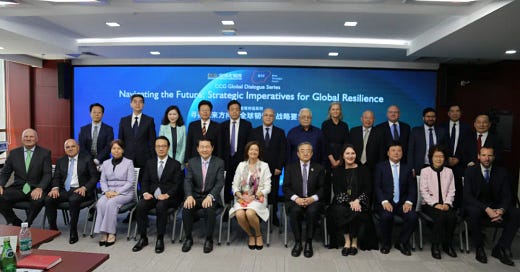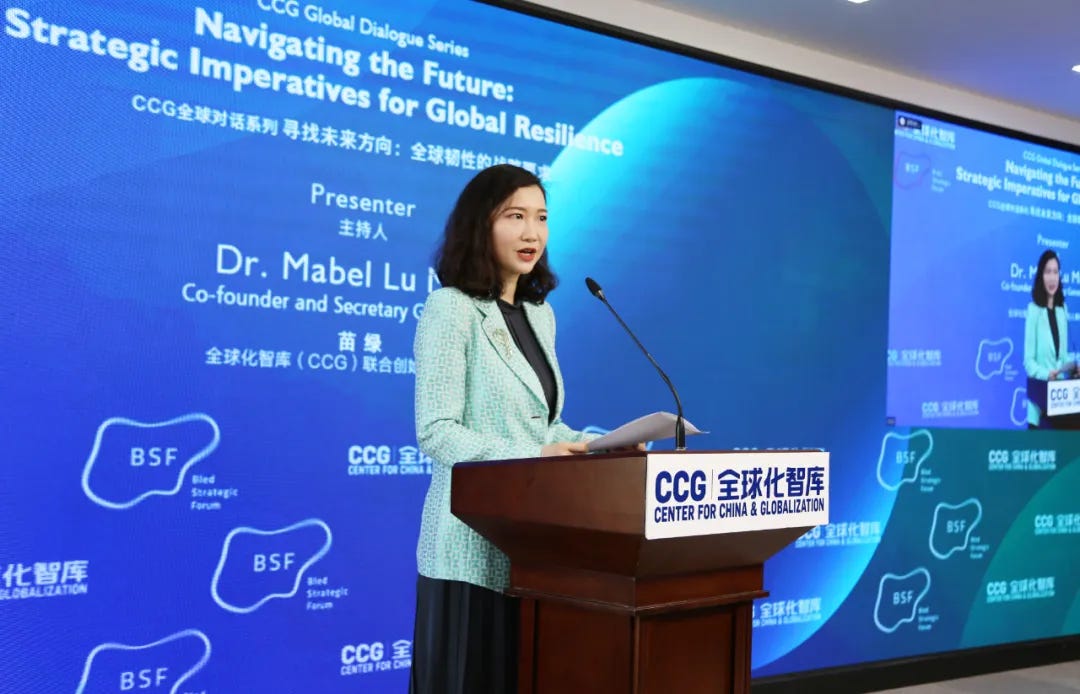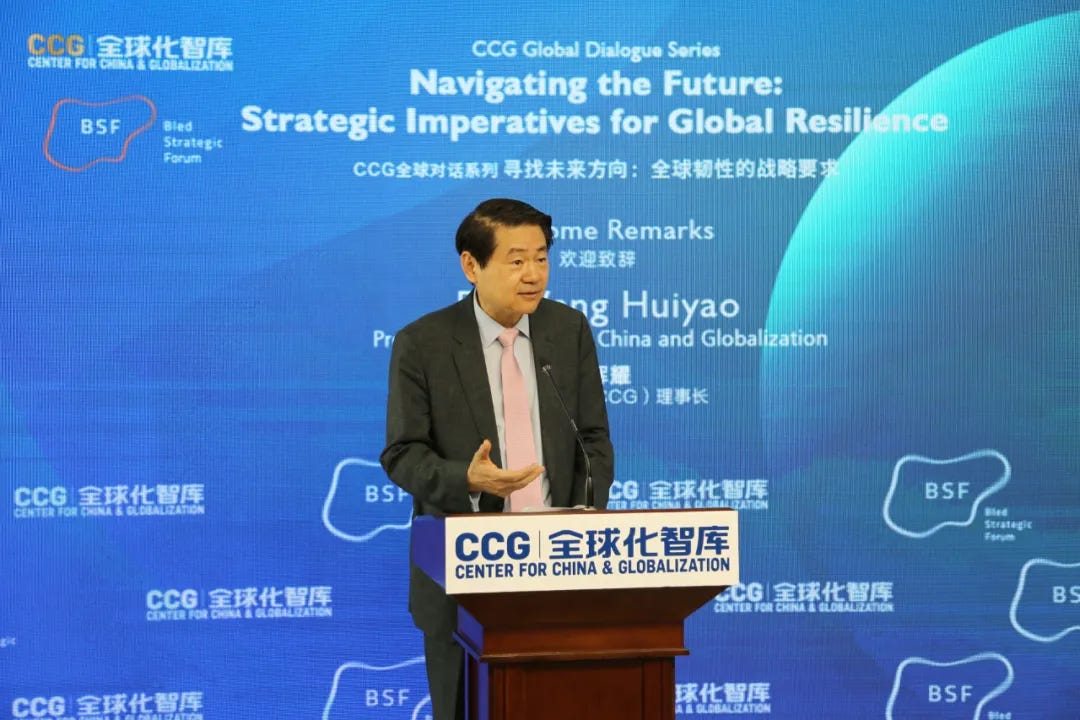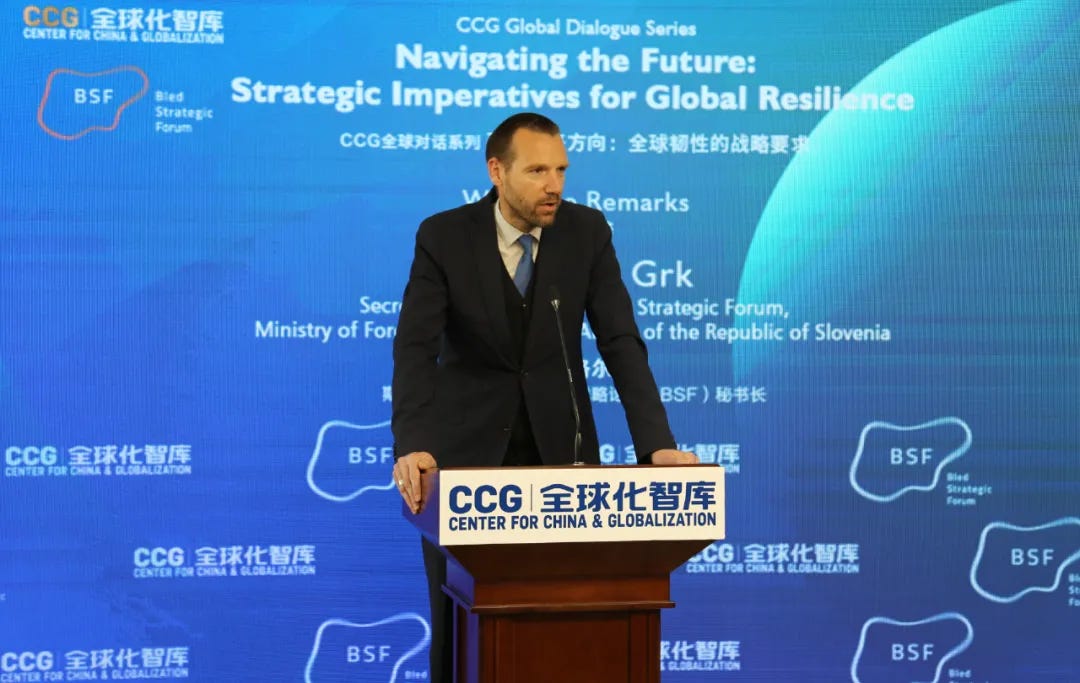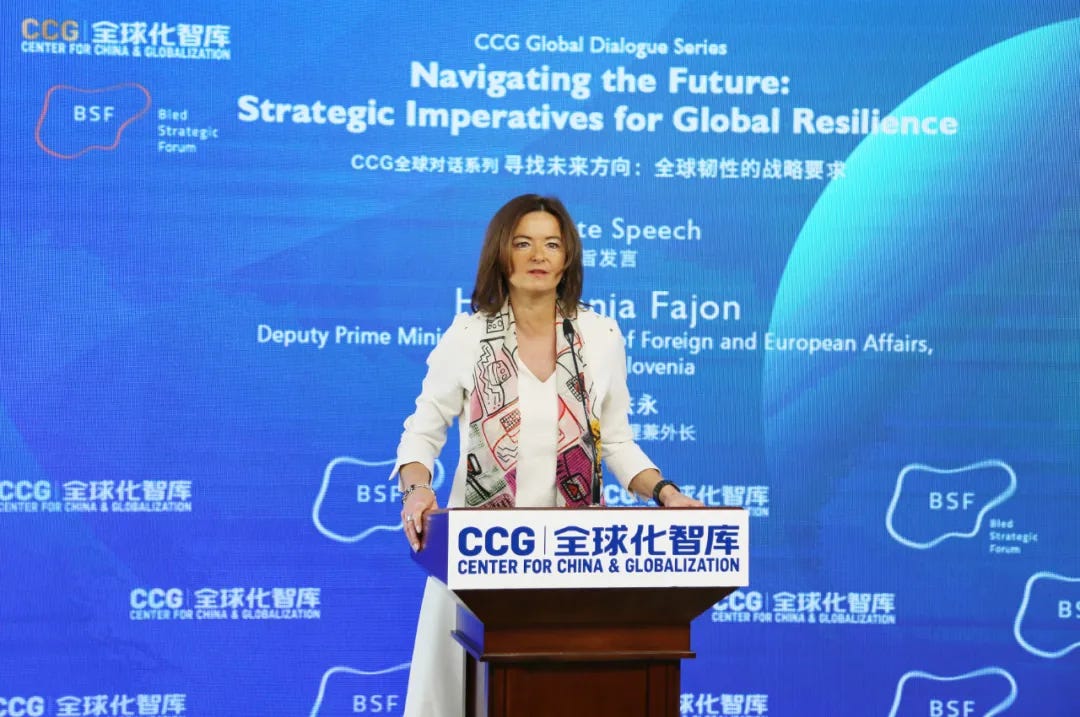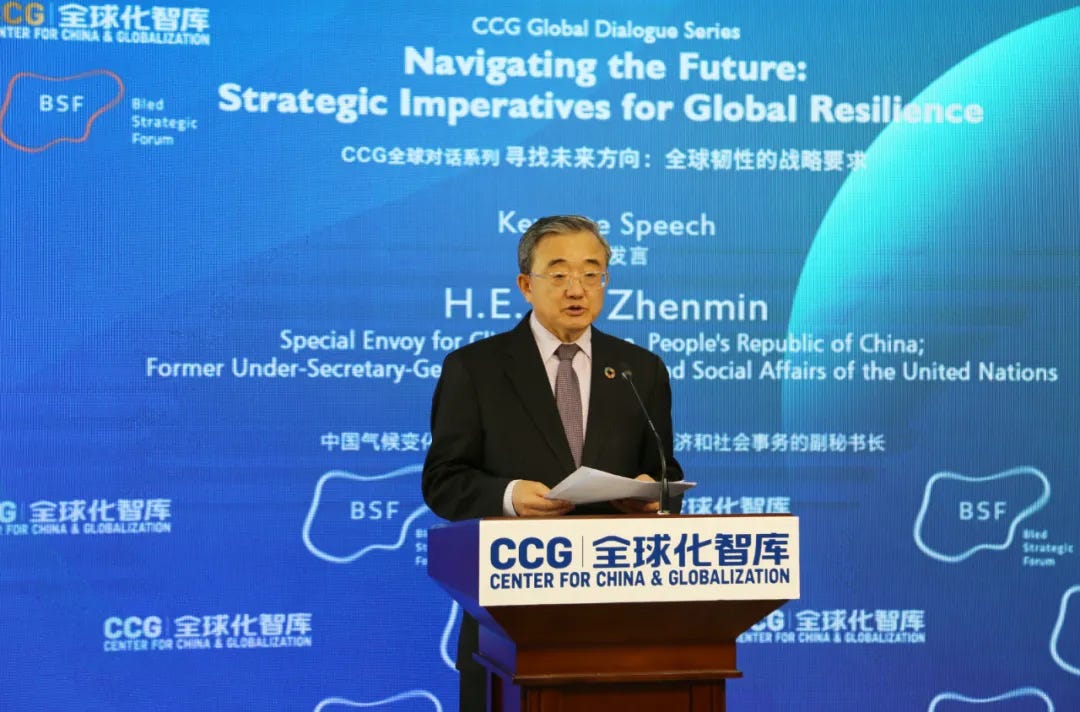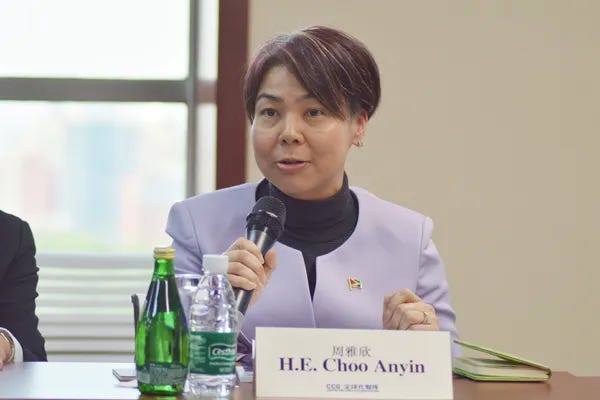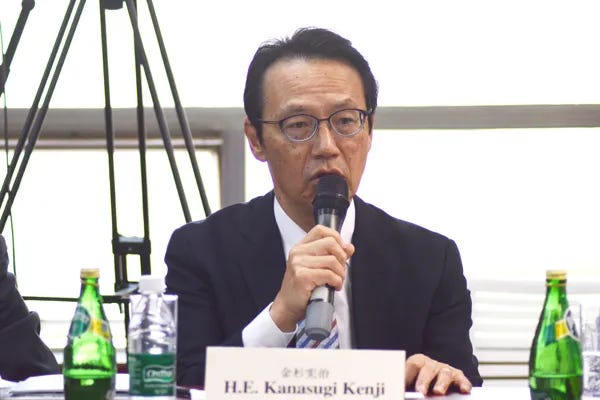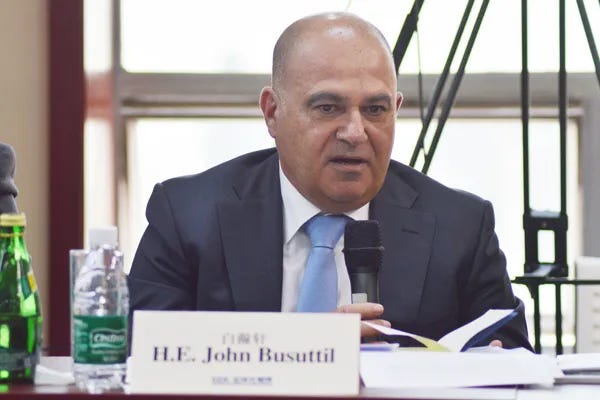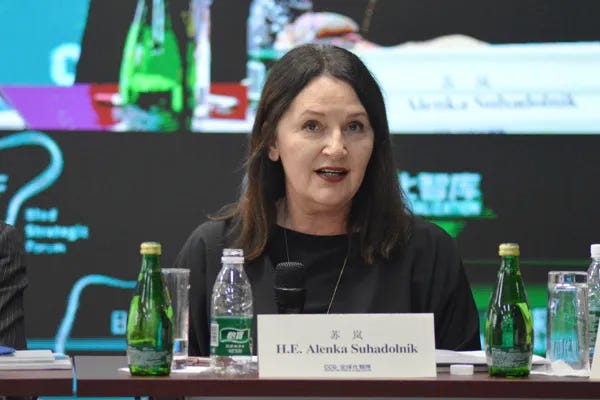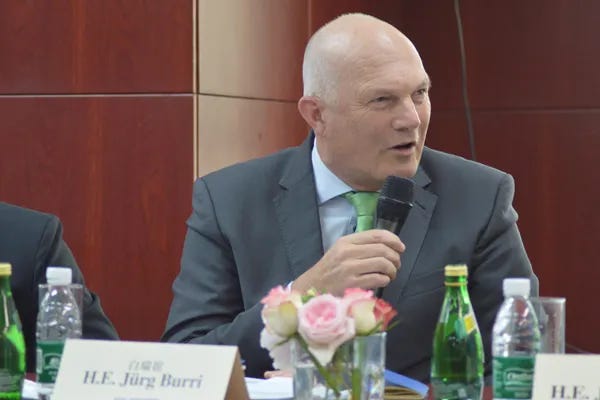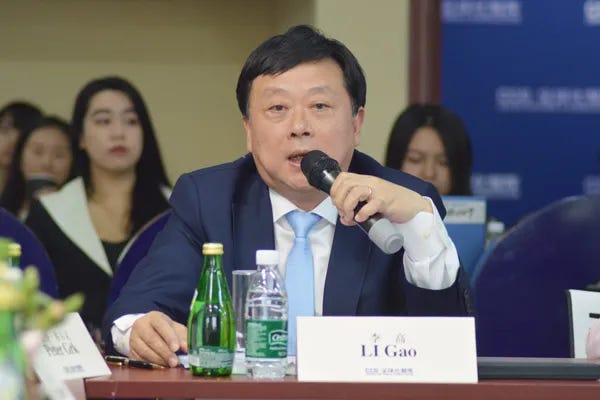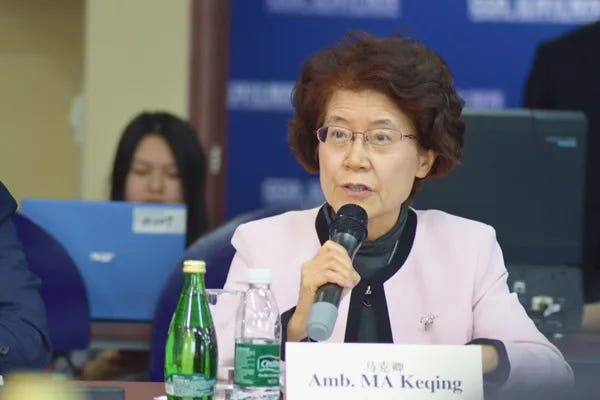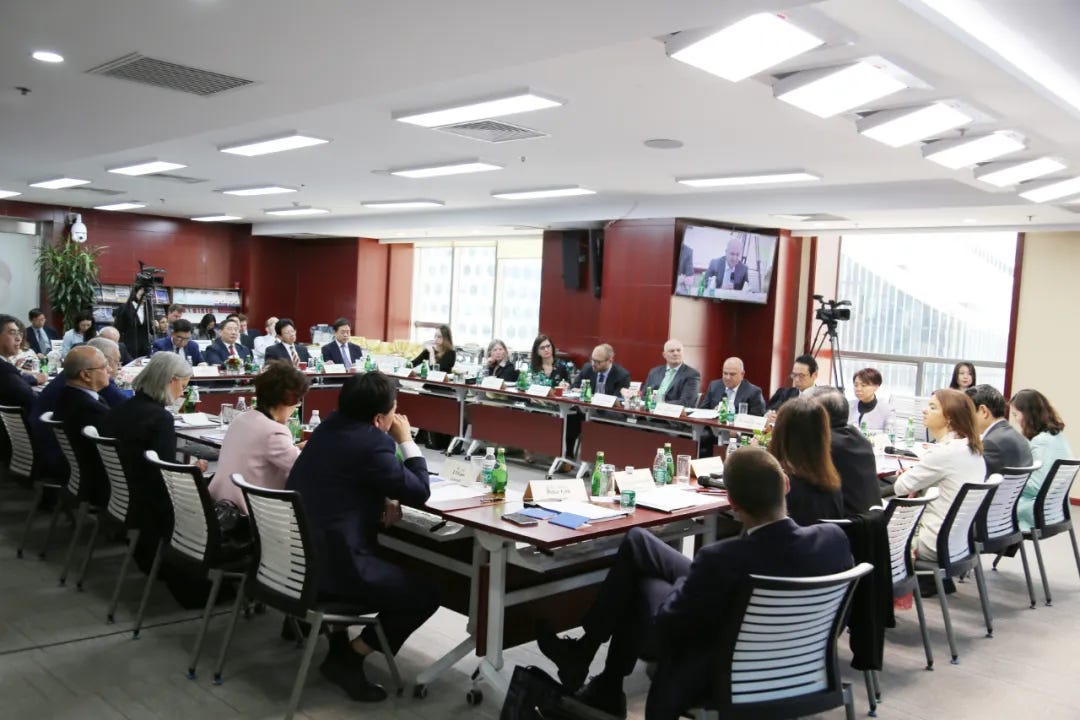Slovenian Deputy PM Fajon and China's Climate Special Envoy Liu at CCG Roundtable
Liu Zhenmin, Tanja Fajon, Peter Grk, Choo Anyin, Kanasugi Kenji, John Busuttil, Alenka Suhadolnik, Jürg Burri, LI Gao, MA Keqing engage on global resilience for climate crisis and sustainable future.
On Saturday, April 20, 2024, the Center for China and Globalization (CCG) and the Bled Strategic Forum (BSF) co-hosted a roundtable on "Navigating the Future: Strategic Imperatives for Global Resilience." The event was honored to host Liu Zhenmin, Special Envoy for Climate Change, People's Republic of China; Former Under-Secretary-General for Economic and Social Affairs of the United Nations, and Tanja Fajon, Deputy Prime Minister and Minister for Foreign and European Affairs of Slovenia.
The list of speakers by order of appearance:
Mabel Lu Miao, Co-founder and Secretary-General, CCG
Wang Huiyao, President, CCG; former Counselor to the State Council
Peter Grk, Secretary General of the Bled Strategic Forum, Ministry of Foreign and European Affairs of the Republic of Slovenia
Tanja Fajon, Deputy Prime Minister and Minister of Foreign and European Affairs, Republic of Slovenia
Liu Zhenmin, Special Envoy for Climate Change, People's Republic of China; Former Under-Secretary-General for Economic and Social Affairs of the United Nations
Choo Anyin, Ambassador of Guyana to China
Kanasugi Kenji, Ambassador of Japan to China
John Busuttil, Ambassador of Malta to China
Alenka Suhadolnik, Ambassador of Slovenia to China
Jürg Burri, Ambassador of Switzerland to China
LI Gao, Member of Environment and Resources Protection Committee, National People’s Congress
MA Keqing, Executive Vice Chair, China National Committee for Pacific Economic Cooperation (CNCPEC); former Chinese ambassador to Finland, the Philippines, and the Czech Republic
The roundtable was covered by domestic media outlets such as China Central Television, China News, and Pheonix News, The full video of the event was also broadcast on various platforms and remains available on WeChat and YouTube. See also coverage of this event on the official websites of the Slovenian government and Bled Strategic Forum.
The Embassy of the Republic of Slovenia in Beijing has kindly reviewed the remarks by Deputy Prime Minister Fajon and Ambassador Suhadolnik. Please note, however, that the remaining remarks have not been reviewed by the speakers or their staff.
Mabel Lu Miao, Co-founder and Secretary General, CCG
Ladies and gentlemen, good morning!
Your Excellency Tanja Fajon, Deputy Prime Minister and Minister for Foreign and European Affairs of Slovenia,
Your Excellency Liu Zhenmin, Special Envoy for Climate Change of China and Former Under-Secretary-General for Economic and Social Affairs of the United Nations,
Distinguished ambassadors to China,
Welcome to the Center for China and Globalization (CCG)! Welcome to the CCG Global Dialogue Series! Today's event is jointly organized by the Center for China and Globalization and the Bled Strategic Forum of Slovenia. Our forum today is titled "Navigating the Future: Strategic Imperatives for Global Resilience." Participants will delve into proactive strategies for long-term global resilience, the adaptation of governance frameworks, and the infusion of innovative measures into global strategies, fostering collaboration and forward thinking. We sincerely anticipate the insights and perspectives that will be shared later. Firstly, let us invite the representatives of today's event hosts to deliver the opening remarks. Let us welcome Dr. Henry Huiyao Wang. Dr. Henry Huiyao Wang is the Founder and President of the Center for China and Globalization. He is a former Counselor of the State Council in China. The floor is yours, Dr. Wang.
Wang Huiyao, President of the Center for China and Globalization (CCG); former Counselor to the State Council
Thank you, Dr. Miao.
Your Excellency Tanja Fajon, Deputy Prime Minister and Minister for Foreign and European Affairs of Slovenia,
Your Excellency Liu Zhenmin, Special Envoy for Climate Change of China and Former Under-Secretary-General for Economic and Social Affairs of the United Nations,
Dear ambassadors,
Mr. Peter Grk,
Ladies and gentlemen,
Welcome to today's event. Welcome, the Slovenia Government delegation, to visit China. We are very privileged to have this event and to have also the Bled Strategic Forum to co-organize with us this event today. I had the privilege of visiting Slovenia and also attending the Bled Strategic Forum. So I have profound admiration of Slovenia, which is a very beautiful country. The Bled Strategic Forum has significant influence and we're delighted to collaborate with them. CCG is a non-governmental think tank. We're ranked among the top 100 think tanks in the world and also have been granted the UN "special consultative status," the only Chinese think tank that has been granted special consultative status in China. We specialize in global governance, international relations, China-U.S. relations, and China-European relations. We are very pleased to have established collaboration with BSF for the past years, and we're pleased to here welcome all of you.
So the potential for the development of relations between China and Slovenia is enormous. On May 12, 1992, the two countries established formal diplomatic relations. In May 2022, President Xi Jinping and President Pahor exchanged congratulatory messages on the 30th anniversary of diplomatic relations between China and Slovenia. So we have very long diplomatic relations. China and Slovenia have established mechanisms such as the Economic Joint Commission and the Scientific and Technological Cooperation Committee and have signed numerous cooperation documents, including MoUs on jointly-built Belt and Road. Also, the exchanges of various fields have continued to deepen. For example, in 2022, the bilateral trade between China and Slovenia reached 7.45 billion USB, a year-on-year increase of 24.4%. So today, we're very pleased to have this great event. I really appreciate all of you coming on Saturday, but you can see how enthusiastic we have attach to welcome also many friends to visit in China. And we have, and also we know that Slovenia has been elected as a UN Security Council member, which is also very important. And we have actually invited six UN Security Council member countries to attend the event today. So we have ambassadors from China, from Guyana, and also Japan, Maurita, Slovenia, and Switzerland, member countries of the Security Council.
But we also have other ambassadors from Cyprus, from Jordan, from Palestine attending our event today. And of course, we have also representatives from the Chinese People's Association for Friendship with Foreign Countries; we have representatives from the Ministry of Foreign Affairs with us.
And also we know that this year we're gonna have a UN Summit of the Future summit, which is very important. And we have so many UN Security Council member countries represented today. Getting gathered in China is very important. Also, we have a newly appointed China envoy for climate change, former vice minister Liu Zhenming also attending our event. So welcome all of you. I think this is an event we're we're with high expectations and we're going to really listen to all of you. This is increasingly important that we're facing the challenges today, and we're going to discuss them in today's event. So I'll stop here and I'd like to extend my warmest welcome to all of you again and thank the Deputy Prime Minister for visiting CCG and China. Thank you.
Peter Grk, Secretary General of the Bled Strategic Forum, Ministry of Foreign and European Affairs of the Republic of Slovenia
Thank you very much, Mabel. I'm going to be brief. Let me tell you just a couple of things that I noticed in my short visit to China. It's my first time in China and in Beijing. Of course, like everybody, I was very impressed with the development of China in the last decades. But I was even more impressed with another thing, and that is the hospitality that I was offered here, be it from the Ministry of Foreign Affairs, be it from the CCG. This hospitality is something that will not be forgotten. So thank you very much again, CCG. I really value our partnership, I value collaboration, and I'm looking forward to our endeavors also in the future. Actually, I have a hard task now because I have to return this hospitality in Bled, but I will try my best. So, Henry, and Mabel, thank you very much again.
You know how this Chinese proverb goes, "May we live in interesting times." I think this probably holds true, especially now in the times that we're living in. And I would actually say that we're not just living in interesting time, but in highly volatile and highly dangerous times. You know, Italian philosopher Gramsci once said that when the old world is dying and the new world hasn't been born yet, the monsters come. And we're in this period of time when the monsters are coming. It's going to be very important that we, as a global community, understand the times that we're living in, but that we also take lessons learned from the past and try to work together in order to make this global community sustainable and prosperous.
What we learned in Slovenia as a small country, also now being a member of the UN Security Council, is one thing. And this is for me, a strategic imperative, if you want to call it. What we learned is that we're living in a highly divided society. There is a lot of particular interests and not a lot of solutions which would look at the common good. As the UN Secretary-General said, in one of his speeches, "(for the) common good." So for us as a small country, our imperative is to listen—not just to talk, not just to stay in its own silos, but to actually listen to other global players, to other countries with whom we may not necessarily agree on all the points, but we will try and we're trying to understand their positions, to understand their goals, to understand their ideas. And through this understanding, we hope that we can come to common solutions which are going to actually contribute to this common good, to a global community, which is going to be peaceful, stable, and sustainable. So in this sense, this roundtable is also a small contribution to these discussions, to trying to understand one another, trying to listen to one another and see where are these common goals, common issues that we need to address in order to move forward from the situation that the global community is currently facing. You all know the problems, you all know the issues that are on the table. And I think it's high time that we moved from just analyzing the situation and tried to do everything that we can to find solutions. So thank you once again for this meeting. Thank you, CCG, for offering us this opportunity and I wish you all nice and constructive debates. Thank you very much again.
Tanja Fajon, Deputy Prime Minister and Minister of Foreign and European Affairs, Republic of Slovenia
Thank you very much. One good morning, maybe a good day already. I have to say that it's a very great honor and also a great privilege to be here today with you. And thank you for coming on a Saturday morning. Thank you, CCG, together with the Bled Strategic Forum, for organizing today's event and for all your participation.
For Slovenia, being here in China is an amazing experience. And I would like just to share a few thoughts and impressions, if you allow me, after four days of official visit to China, my first one to China, but with a very significant meaning. We spoke together with my host, the Chinese foreign minister, some months ago when Slovenia became an observer in the UN Security Council. And I found it extremely important that we carry on our dialogue, that we continue our discussions.
Our campaign for becoming a member to the UN Security Council was called “Building Trust. Securing Future.” And building trust is exactly what I would call it after this week. Being here for four days experiencing this amazing hospitality and a lot of talks with my counterparts on the political level, also on the economic level, with the civil society, academia. So with the media, it is an eye-opener. And what I say is we might have differences coming from different sides of the world—be it cultural, be it historical differences. But for that reason, it is important that we have a dialogue, that we can understand each other, that we can listen to each other and mostly hear each other. Because at the end of the day, we have so many global challenges that we have to address together.
And this is what this week was about, building trust and addressing global challenges together. And at the end of the day, it's our common shared responsibility: peace and security and defending international law and UN Charter. I am very proud because Slovenia, in this first months (of its membership in the UN SC), is showing a very consistent approach to different parts of the globe. We want to discuss with all different partners in the regions, exactly for the reason that we carry out the dialogue despite the differences and try to find compromises to fight together global challenges. And I will just echo at the end the words of the foreign minister from China, which I really liked. He said, Slovenia might be a small country, but with a big diplomacy. And this is, let's say, my guidance for the future, a very challenging future for all of us.
Now on the topic of today, to survive future challenges, we will have to find certainly an effective way to truly (build) global resilience. Today's challenges are all interlinked and largely exceed the capacity of any single country or region to confront them on their own be it a small or a big one. The fact that we are faced with numerous armed conflicts—I think we count around 55 of them—that are creating millions of refugees and displaced persons, as well as rising poverty and inequality, water stress, food insecurity, interdependent triple planetary crises of climate change, biodiversity loss, and pollution, shows that we—more than ever—need effective multilateralism with strong United Nations at its core.
And the current multilateral system, unfortunately, often lacks efficiency—we see it today—and swift reaction when tackling global challenges. We do not have to reinvent it, but to make the global governance work, we need a multilateral system built on trust, respect, and, as I said, international law, in which the United Nations, its agencies, the international financial institutions, the regional organizations, and others would work in synergy. We need the United Nations adapted to new realities and resilient against future shocks.
And in order to achieve all that, we must first of all be consistent in fully implementing the commitments we have already taken. Second, we should make use of the processes under Our Common Agenda and particularly the Summit of the Future, which presents a step in the right direction towards the reinvigorated and reformed UN system, fit for today and the future. And when I'm speaking about the Summit for the Future, I can say that this September, when it will be a high-level week, Slovenia will be also presiding the Security Council. So we are working hard to make this month a successful one.
They also have the potential to put implementation of the Sustainable Development Goals back on track and reform financing for development. And the expectations from the Summit of the Future are high and we must all work together to meet them. To secure a better future for all of us, we must do more. In the distinguished panel, we have representatives, we heard, from the states that are members of the UN Security Council. And this is indeed, one could argue, one of the most important bodies within the UN system. As the name stipulates, it deals with peace and security issues, but as mentioned before, the spectrum of security-related questions is expanding.
As being a member now for the second time in history (Slovenia was the first time a member of the Security Council between 1998 and 1999), we can see first-hand how the world has changed in the last twenty years. This is why we included climate change today among the thematic priorities of our membership, as we believe that this will become more and more, albeit maybe indirectly, also part of the UN Security Council agenda.
On Climate Crisis.
Climate crisis is looming. We can face it in different parts of the world. Just look to Dubai last week. But also looking to Slovenia some months ago, we faced the worst floods in the history of our country. And a year before, we experienced serious drought and the biggest wildfires. Science is clear: the only way forward is the phasing out of fossil fuels.
The Global Stocktake of the Paris Agreement showed we are doing far from enough for efficient climate change mitigation and adaptation. And in the framework of COP process, we need to be more ambitious and more decisive. China was instrumental in achieving the COP15 Kunming-Montreal Protocol on biodiversity and is a leader also in the climate negotiations.
So we commend China for its contribution in green energy transition, in particular in investing significantly into renewables and energy efficiency. We in Slovenia are also undertaking this path.
On Science and Technology.
Science and technology are crucial. We need to invest more, but we need also to use it better. Early warning for disaster risk prevention based on space technologies, in particular, satellite imagery, well developed by Slovenian companies improves predictability of flooding and enhances the security of food and water supply, land use, and construction planning among others, and thus contributes to standard of living and economic growth.
On water and nature-based solutions.
Water is another key priority. Slovenia is one of the rare countries that has written access to quality and healthy water in our Constitution. We call for transboundary cooperation in preservation and sustainable use of water resources, as water and water-related ecosystems are crucial for effective climate actions.
At the last two COPs, we saw progress. But let us be frank, it was not enough. We were not ambitious enough. Now we need to strengthen the awareness on the relevance of water and water-related ecosystems for mitigation as well.
Nature plays an immense role in every aspect of our lives and is one of our strongest allies in tackling climate change. However, biodiversity loss and degraded ecosystems accelerate climate change and its negative impacts.
To reach the ambitious climate and biodiversity goals as well as to achieve Sustainable Development Goals, we need to maximize synergies between climate and biodiversity action, with the implementation of nature-based solutions as a key instrument for addressing these challenges. Nature-based Solutions can create jobs and contribute also to economic and very important social development.
Let me mention just transition.
We need to ensure a just green transition and climate justice for all. And climate justice is about finance; it's about human rights, access to justice, and solidarity.
One of the major achievements of last COP is the decision on the Loss and Damage Fund. Slovenia was among the first to pledge a contribution to the fund, 1.5 million EUR. It’s a large contribution If you look at the GDP of our country, we can compare ourselves to other bigger countries in the EU. In addition to that, our Government contributed also the same amount of money to the second replenishment of the international Green Climate Fund. Climate and environment-related issues are also a priority theme for our development partnerships and assistance.
Inclusiveness, gender-responsive action, and human rights-based approach are crucial for efficient climate and wider environment action. And we are happy with the inclusion of the right to clean and healthy environment in the COP outcome documents, but still need to do more for its implementation.
Solidarity means also listening to each other and understanding each other's position.
On climate and security nexus.
Climate change and increasing water scarcity are risk drivers that can exacerbate the existing conflicts, provoke new conflicts, and even threaten the very existence of states. During our candidature for the UN Security Council, many countries, especially small ones or more remote from here, raised the issue of climate and water security and asked us to pay attention to this issue if elected to the UN Security Council. We promised we would, and we keep the promise.
Our focus is on prevention and peace-building. We firmly support the work of the Climate Security Mechanisms and climate advisors on the ground.
There is a growing understanding of the intricate links between climate change, environmental degradation, resource scarcity, and conflict. In addition to several open debates and discussions in the Arria Formula on climate security in last years, the open debate under the Guyana Presidency on climate and food security in February this year is evidence of growing awareness of the complex interconnectedness between climate change and conflicts.
So we listened attentively to the statement of China at the open debate back in February in New York, and we cannot but agree with the assessment about emerging common understanding of the relationship between climate change and security. We also fully agree that specific connections and interplay between the two have to be further analyzed and understood. So that was about the topic of today, which I find, as I said, interlinked with everything that is globally happening around the world with challenges that we're facing. It's very much interlinked. Unfortunately, you know well what the Security Council is doing in the last weeks and months is trying to bring peace in the Middle East and also in Ukraine, to major conflict areas but also in the other parts of the globe. But just to mention, to see the paralysis and inefficiency in the Security Council, where we are not in a position to really adopt resolution that can bring peace to people in Gaza, to end the conflict, to ensure security for Israelis and Palestinians living side by side—that we are having so different positions – that results in not being able to end the human suffering.
I said a few times in the past, the world has failed on the test of humanity. So it is our, dear friends, shared responsibility that we are aware of all these challenges. And if we try to address them together, that we try to address them through dialogue, and through the existing mechanisms. So I can just encourage us to cooperate, have loud voice when it's necessary, and mostly what is important, protect civilians, children, and people in need all around the world. Thank you.
Liu Zhenmin, Special Envoy for Climate Change, People's Republic of China; Former Under-Secretary-General for Economic and Social Affairs of the United Nations
Thank you, Mabel, for this beautiful instroduction. And thank you, CCG, for the kind invitation.
Your Excellency, Deputy Prime Minister Fajon,
President Wang of the Center for China and Globalization,
Secretary-General Grk of the Bled Strategic Forum of Slovenia,
Excellencies,
Distinguished participants,
Ladies and gentlemen,
Good morning!
It is a great honor to join you today. Let me start by congratulating Deputy Prime Minister and Foreign Minister Fajon for her visit to China. I am honored to join her to offer another keynote speech, but my speech will be very short.
Dear colleagues, as our human beings enter the post-pandemic era, our world continues to face four major challenges:
First, geopolitical conflicts have created the biggest political crisis since the end of the Cold War. Second, the global economy is having a hard time recovering, and the process of economic globalization has encountered setbacks. Third, climate change severely threatens human survival and development. Fourth, rapid developments in artificial intelligence have caused significant unease about the future.
In this context of multiple challenges to world peace and development, our meeting today to discuss global resilience is of great significance. Looking forward, to strengthen global resilience, I wish to share the following four points:
First, safeguarding world peace to lay the foundation for global prosperity and development. Peace is a prerequisite for global resilience and the foundation for common security and growth across nations. Since the end of the Cold War in 1991, the world has enjoyed over three decades of stability, ushering in a golden age for rapid economic development. Today, although peace and development remain the prevailing trend of our times, there are new tensions.
Major power rivalry and confrontation, the prolonged Ukraine crisis, the ongoing Palestinian-Israeli conflict, and other regional hotspot issues continue to arise. In our Asia-Pacific region, there are emerging signs that warrant high vigilance. Over the past year, the South China Sea has seen a lot of tension, with intensified military cooperation among the U.S., Japan, and the Philippines; at a trilateral meeting last week (on April 11), they announced several measures to deepen cooperation in defense. This approach introduces new external influences into East Asia and creates exclusionary political blocs, posing great danger.
Dear colleagues, we must carefully review historical experiences, cherish and safeguard world peace, respect national sovereignty and territorial integrity, resolve conflicts peacefully, replace zero-sum games with win-win cooperation, and strive to create a more harmonious and stable environment for the healthy development of the world.
Second, improving economic globalization to sustain the vitality and momentum of global economic growth. Economic resilience is a crucial aspect of global resilience. Currently, the global economy is struggling to recover, and growth momentum is insufficient. The World Bank has made a pessimistic prediction that the average annual global economic growth rate for the current decade will drop to a low of 2.2%, which it calls a "lost decade" for the world economy. Some countries, in a bid for narrow self-interest, have built "small yard and high fence" and pursued "decoupling" or "de-risking." That not only hinders their own development but also weakens economic globalization and slows global economic growth.
We must and we need to reinvigorate economic dynamism and push for a more universally beneficial and inclusive form of economic globalization. "Universally beneficial" means growing the economic "pie" and dividing it fairly, so that people from different countries, different social classes, and different groups can all participate in and share the fruits of economic and social development. "Inclusive" means supporting countries in taking development paths suited to their national conditions, rather than imposing a one-size-fits-all model. This approach will help maintain the stability and smooth functioning of global industrial and supply chains, ensuring the vitality and momentum of global economic growth.
Third, actively addressing climate change to achieve green, low-carbon, and sustainable development. Climate crisis profoundly impacts human survival and development. Tackling climate change is a crucial task for achieving global resilience. The adoption of the 1992 United Nations Framework Convention on Climate Change (UNFCCC) established the concept of sustainable development and initiated international cooperation on climate change.
The Paris Agreement in 2015 significantly strengthened international cooperation by setting out long-term temperature goals of 1.5°C to 2°C and aiming to reach global peaking of greenhouse gas emissions as soon as possible. It also set out to achieve a balance between anthropogenic emissions by sources and removals by sinks of greenhouse gases in the second half of this century, introducing many innovative regulations like Nationally Determined Contributions (NDCs) and global stocktakes. The Glasgow Climate Pact in 2021 further urged the state parties to achieve net-zero emissions around mid of this century. At COP28 in Dubai last December, the first global stocktake of the Paris Agreement was successfully completed, showcasing humanity's resolve to speed up low-carbon development, embrace green transformation, and move away from fossil fuels.
Currently, the green transformation is a clear global trend, with 151 countries having set goals for carbon neutrality. These countries account for 92% of the global GDP, 89% of the global population, and 88% of global emissions. All these have demonstrated that humanity is moving towards a decarbonized era in line with the objectives and pathways of the Paris Agreement.
Dear colleagues, we must also recognize that human efforts are still far from efficient. International climate cooperation needs further strengthening. In recent years, the world has experienced frequent natural disasters such as wildfires, heatwaves, and floods. The average temperature in 2023 was over 1.45°C higher than pre-industrial levels, making it the hottest year on record. Experience shows that we need to strengthen global climate cooperation within the framework of sustainable development, with a focus on enhancing implementation to ensure the sustained success of the UNFCCC and its Paris Agreement.
Fourth, strengthening the governance of artificial intelligence to ensure that this new technology benefits humanity. AI has reached a crucial stage of explosive development. It will provide significant impetus for energy transformation and industrial upgrading and profoundly affect human production and way of life. However, due to the absence of governance rules, differences in national policies, and technological gaps, AI also poses many new challenges.
During my five years tenure as Under-Secretary-General of the United Nations, we convened annual meetings of the Internet Governance Forum (IGF), for five consecutive years without, unfortunately, establishing any digital governance rules, due to differences among member states. The IGF will commemorate its 20th anniversary next year. Its mandate will be reviewed by the World Summit of Information Strategy. But I believe this governance process must continue. I also believe that countries must approach AI development with caution, strengthen AI governance, and ensure safety before proceeding.
Dear colleagues, last October, President Xi Jinping of China proposed the Global AI Governance Initiative, which clearly articulated the essence of global AI governance. In summary, our main focus should revolve around three key aspects: First, ensuring that AI technologies benefit humanity. The goal of AI should be to increase wellbeing of humanity. Second, ensuring security. AI should always remain under human control. Third, ensuring equality. All countries should have equal rights to participate in and benefit from the development of AI.
Dear colleagues, thank you for your attention to these four points. I wish you have a very pleasant weekend.
Roundtable
Henry Huiyao Wang:
We had a very good keynote from Deputy Prime Minister Tanja Fajon and, of course, from the Special Envoy on Climate Change of China, Minister Liu Zhenmin. And of course, we have also heard from the Secretary General of BLED Strategic Forum, Peter as well.
So I think now we're coming to our roundtable. CCG has a very long history of holding ambassadors roundtables. We have actually held over a dozen roundtables in the last two years. And today, we're very honored to have a number of ambassadors join us at this special event.
Both Deputy Prime Minister and Special Envoy have mentioned so many important points on global governance issues. I remember last year when we went to Slovenia, there was just a heavy flood, which was unprecedented and showed the consequence of climate change—it's impacting every one of us.
The topics of today's roundtable are:
In what ways is collaboration between nations shaped by the large-scale challenges that we're facing today?
What are the key elements of a proactive approach to ensuring long-term global resilience in the face of evolving environmental challenges?
How can global governance frameworks adapt to effectively address the multifaceted challenges posed by environmental changes today?
How can we enhance mutual understanding to safeguard the future?
What role do innovative measures play in shaping a sustainable future, and how can they be integrated into global strategies?
How can we avoid double standards and, at the same time, take into account specific situations and contexts?
So we have many topics. I would like to first invite the Security Council Member Countries. According to alphabetic order, I would like to invite H.E. Miss Choo Anyin, Ambassador of Guyana to China to speak first.
Choo Anyin, Ambassador of Guyana to China
Thank you very much, Dr. Wang. I'd also like to express thanks to CCG and my colleagues from Slovenia for granting me the opportunity to have this engagement with fellow colleagues and distinguished members at this forum today.
I just want to start off by saying that I believe I have the right to say that Guyana is the country with the smallest population in attendance here today. We have a population of 800,000 people. We're part of the Caribbean Community. And for those who've been to the Caribbean and have experienced our warm hospitality, you know how vulnerable we are to the effects of climate change. And I do agree that sometimes when we speak about climate change, we're not using strong enough terms. We say "environmental challenges". I would like to prefer to use the term "climate crisis", as many of my colleagues would like to refer to it. And the term actually says how urgent and how important it is that we take immediate action on it. For us in the Caribbean, it's not a matter of "if", but it's a matter of "when" because all the countries of the Caribbean, including Guyana, are very susceptible to the effects of climate change.
Every year we have massive flooding in Guyana, which wipes out a majority of our agricultural products. So Guyana has set a very ambitious agenda for itself in the international community, and we want to be a part of the conversation, a part of the solution, and we want to be a part of providing the solution to the global community. And I say that because for Guyana, climate security, energy security, and food security are very important on our agenda. As a non-permanent member of the UN Security Council, I think that it is important that we also advocate for countries that are similar in their interests, like Guyana.
I think that is important to note-and I know that we've heard this here before this morning-that as part of the global community, we're many members with different sizes, different levels of economic development, and different interests, we will not agree every single thing. But it is important for us to find those areas which we have common interests in and to have those very difficult dialogues. It's easy for us to say that we want to have a dialogue. But when it comes to having substantive dialogues that we need and to take immediate action resulting from those dialogues is not something that we're very good at, as members of the global community. And as we procrastinate and as we consider, the clock is ticking. And as the clock ticks, we're all very vulnerable and the majority of the global community becomes victims of our procrastination. So that's why it is important that in addressing all these issues, we have those constructive dialogues.
In the famous words of my president, President Ali, when he came here in July last year, I remember this very distinctly, he had an interview with CGTN. And what he said really resonated with me. He said that it's not about balance of power now. It's about the balance of responsibility. That is what we need to recognize. It is also very important to note that members of the international community, the small and vulnerable ones are the ones that need to have their voices heard. We're the ones that need immediate action. So it is important that we'll be given the opportunity to have our voices heard, but also to provide solutions and to be a part of that solution. So as we have and we continue to have all these engagements about all these important global issues that affect all of us, how do we ensure that in listening to each other, we understand each other and as a result, we are able to take action that is responsive to our needs?
I mean, it's okay for us to talk about all these challenges, but what do we do afterward? We're still waiting for the $100 billion that was pledged to the global community to mitigate the effects of climate change. But Guyana has not sat back and waited. We have offered solutions. We want to be a part of the global solution. And we want to be a partner bilaterally and multilaterally towards those solutions. It is very easy for us to sit here and say that we want a strengthened multilateral system, we want strengthened international institutions, we want a strengthened financial architecture internationally. But those institutions, those systems are as strong as we want them to be, and they're as strong as we want to make them to be, right? So when we talk about a very sensitive issue which was mentioned, double standards, Guyana has chosen to abide by the principles of international law to ensure that we're fair, transparent, and equitable in dealing with our international global issues. And we would like to encourage our fellow members of the global community to take a similar path. It is more than ever in our country's own interests, many of these international issues. But sometimes when you have a conflict of interests, as we've learned in Guyana, it's always better to take decisions based on principles.
And so I leave you with just a small annotation today that we live in a global world that is borrowed from our children and from our future generations. What are we to do while we're here to ensure that when we give it back to them, it's in a sustainable manner in which they can now carry on the works of making our world sustainable, safe, and stable for their future generations? I'd just like to leave you with that. Thank you very much.
Kanasugi Kenji, Ambassador of Japan to China
Good morning, ladies and gentlemen. Your Excellencies, thank you for your invitation to this important meeting. I feel very honored to be here today. At the outset, I felt very obliged to argue against the statement by H.E. Liu Zhenmin on the South China Sea and economic security. But for the sake of other diplomatic colleagues and because of the time constraint, I would rather not do so today. I would like to focus my attention on how to enhance global resilience on climate change. As we see the multilateral frameworks encountering all sorts of difficulties, starting from the UN Security Council's paralysis and inefficiency, as the deputy prime minister refers to, I think we may better focus on the plurilateral approach for now. That means that like-minded countries get together and try to find a common solution for problems, global common agenda items, and then expand the scope of the membership as we move forward.
And in that area, I wish to draw your attention to two sets of pragmatic approach, which Japan has been promoting in the area of climate change. One is what we call a Joint Crediting Mechanism (JCM). That is a kind of carbon credit exchange program, which intends to supplement Article 6 of the Paris agreement. Japan so far concluded agreement with the 28 partner countries, primarily Asian countries. Of course, the scope is limited and the effect may be somewhat restrained. But I think like-minded countries getting together to promote a common concept is always important.
Another example is what we call the Asia Zero Emission Community (AZEC). As you may know, many Asian countries are still heavily dependent on fossil fuels. So while we vigorously promote the use of renewable energy, we try to make the best use of our existing fossil fuel facilities by introducing so called "co-firing of coal with biomass, ammonia, and hydrogen" and also introducing CCUS technology, carbon capture utilization and storage technologies. So far, eleven countries are joining this AZEC concept. By doing so, we will try to achieve zero emissions at our core fossil fuel facilities. We know that this idea is not that popular among countries, particularly countries in Europe. But we believe that it is a very pragmatic and doable solution for many Asian countries. That's all I would like to say at this moment. And thank you very much once again for your invitation to this very important meeting. Thank you.
John Busuttil, Ambassador of Malta to China
Thank you very much. Good morning, everyone. Excellency, Minister, thank you, Alenka, for this invitation. Henry and Mabel. Yes, I was laughing inside when I heard the Ambassador of Guyana saying (with a population of) 800,000, she considers herself the smallest (population in attendance) here. Actually, she's not. But like Slovenia, another European member state, there's a number of small states currently on the Security Council.
We are currently also president for this month of the Security Council. And during our first presidency of the Security Council last February, we commemorated the first anniversary of the war in Ukraine, which was, as you may imagine, a very, very strong meeting, which sent some very strong messages. But the situation did not change much. And this month as well, we saw that there was an event last Thursday with a vote on the Security Council on the resolution table by Algeria again. So you start to question when the highest body of the United Nations, which came out of the ashes of the Second World War, is unable to resolve situations we're currently facing.
I mentioned as well that we are chairing the office of the Organization for Security and Co-operation in Europe. We didn't ask to be in this position, but the situation was such that there was consensus within this only security organization for Europe, consensus could only converge on Malta. And we took on the role, notwithstanding our position as an elected member of the Security Council.
So seeing all this, one says that probably the upcoming Summit of the Future to be organized in September, comes at a right time. Also there are skeptics who say, there couldn’t probably be a worse time for the upcoming summit because as Peter mentioned, with his quote from Gramsci, across several spheres—geostrategic, technological, climatic, demographic—we are transitioning to a new underlying set of conditions and parameters, and probably this will form the backdrop of global risks that will play out for the next decade.
The fact is that the world has made rapid strides across most human development indicators of very recent decades, tangibly in China—we can see that all around us. But the fragility of these collective gains is evident, in particular with the Covid-19 pandemic, which challenged global advancement with visible reversals in 2020 across multiple economies and regions with respect to education, healthcare, poverty, economic mobility or the ability to improve economic status and related outcomes.
I (wish to) highlight a point made by the Global Risks Report from the World Economic Forum on the current trajectories for global warming. I heard very closely the presentation by Ambassador Zhenmin, that global warming means that at least one climate tipping point or the threshold, at which long-term potentially reversible and self-perpetuating change to a planetary system occurs, could be passed within the next 10 years. In nearly all the IPCC scenarios, the 1.5 ℃ threshold will be crossed in the early 2030s. Based on the latest research, at least four systems are considered (tipping points for) 1.5 ℃: low-altitude coral reef die-off—and we heard from our colleague from Guiana the experience they have—collapse of Greenland and West Antarctic ice sheets, and abrupt thawing of permafrost. There is also new evidence to suggest that the North Atlantic subpolar gyre (SPG) circulation could additionally be placed at risk at 1.5 ℃, with the boreal forest, mangroves, and seagrass meadows always starting to become vulnerable.
As Malta, we have a perspective, of course, of being a small state. And having previously been part of the Small Island Developing States (SIDS) group, we have a deep affinity with SIDS and actively support them in building resilience to environmental challenges. We have initiatives which encompass a range of activities, including capacity building with the Small States Centre of Excellence which is based in Malta, co-chairing the UN Steering Committee on Partnerships for SIDS, organizing webinars on SID-specific themes, launching an institute for Islands and Small States, as well as collaborating with other entities.
To conclude, I'm an optimist; the future is not fixed. A multiplicity of different futures is conceivable over the next decade. Although this drives uncertainty in the short term, it also allows room for hope. Alongside global risks, defining changes are on their way, like unique opportunities to rebuild trust, optimism, and resilience in our institutions and societies. It is my hope that we heed the vital call to action for open and constructive dialogue among leaders of government, business, and civil society to take action to minimize global risks and build long-term opportunities and solutions. Small states, of course, have a contribution in this regard, and I believe we are doing it. Thank you very much.
Alenka Suhadolnik, Ambassador of Slovenia to China
Dear Dr. Wang, Esteemed Deputy Prime Minister, Special Envoy for Climate Change, Colleagues, Good Morning, everyone.
Deputy Prime Minister and Minister for Foreign and European Affairs, H.E. Fajon presented the overview of the global environment landscape and Slovenian climate governance ambitions. As we all know, it is always difficult to speak after the Minister.
So I will make just two minor points and address one of the questions asking about innovative measures and global strategies. Several of the predecessors already mentioned that we're approaching the Summit of the Future that was initiated in 2022. One of the tenets of the Summit of the Future is intergenerational solidarity, or as it is said, solidarity between peoples and future generations. I would like to bring attention to a book on climate fiction that was published two years before the Summit of the Future was announced. The title of that climate fiction book is The Ministry for the Future. The plot of the book is the following: It follows an international organization deriving out of The Paris Agreement, named the Ministry for the Future, which acts as an advocate for the world's next generations of citizens as if their rights were as valid as the present generation's.
So I believe that the art—well,a good art—is announcing the future. It's announcing the world to become. In our profession, it is very good to be able to detect how the world is going to turn out, I would say. But what is also true about the art and maybe some other facets of life is that it's lurking on the margins. Before we spoke, it was mentioned "small yards, big fences," but I would also mention the margins. Maybe from the margins, we can see further or differently, or maybe simply we're not blinded by the central spotlight, also referring to Guyana's introduction.
The second point would be that we really need to look - when we're speaking about global climate governance –into different facets of our societies. For instance, the Global report on effective governance from last year mentioned that while cities hold 70% of the global population, theyaccount for 80% of energy consumption—so altogether, overall, 70% of human-induced environmental impact is produced in the cities—they are not mainstreamed in the global governance.
So, we are talking about 70% of the population, 80% of the impact. When we are thinking about the global governance structure concerning the climate, we should be innovative and looking into certain facets that are not yet properly integrated into our common deliberation. Mind you, of course, cities are usually also the global hubs of innovation that are already producing new solutions to address climate change at the same time. I must say, the first time we met with H.E. Liu Zhenmin, we were both invited by CCG to speak at the roundtable on “China, US, EU, and Global Climate Dialogue for a Sustainable 21st Century.” The discussion, of course, revolved around global climate governance and green development, at the time of climate crisis and other global challenges. What became a common understanding is that what is urgently needed is cooperation among China, the U.S., and Europe. Well, that is correct. Also, as you pointed out on the emissions side the mentioned triad is crucial in addressingclimate change. While this is correct, , one needs to ask how to involve everybody in that deliberation.
And if I may just briefly return to The Ministry for the Future. As you can see, that is one of my favorite books. The Ministry for the Future, with its emphasis on climate science, always returns to the point that diplomacy and how appropriate governance structures are the only way out of the climate crisis. Once, referring to the roundtable last fall, which pointed out the three main emitters, the question I think that needs to be asked today: Isn't the time that the climate security is also properly mainstreamed in the main security body that the international community has, that is, the UN Security Council? Thank you.
Jürg Burri, Ambassador of Switzerland to China
Ministers,
Excellencies,
Dear colleagues,
Ladies and gentlemen,
Thank you for the invitation, Dr. Wang, to this very important workshop. I always hope to be invited to one of your workshops or fora when my notebook starts running out so that I get fresh ones. I must say, I'm also particularly pleased that these efforts of the countries that are here at the table to position themselves as E10 are supported by your institution. And I can tell you, minister, that we're a very active group of E10 members here in Beijing. We do not only exchange opinions, but we also look for dialogue with our Chinese interlocutors together. And I can also assure you that your ambassador here is certainly a very good exponent of the great diplomacy of a small country that the Chinese colleagues have mentioned.
On global issues, there are issues that we have to tackle by ourselves. And there are issues—and a big number of issues—that we have to tackle together. Switzerland, as a neutral country, always tries to bring itself into the position (where) we may not have the critical mass to give the critical impulse to master the global issue together, but to bring the countries that can master those issues together at one table. Currently, peace and security have been mentioned on the international peace conference on Ukraine. It's certainly something which is very strong on our agenda. But also I would like to mention our permanent contribution to security in the region, the Zermatt Roundtable. I'm very happy that I see various participants in this roundtable here at the table.
I would like to come to the more specific issue of this morning's event, that is, the global resilience against climate change. That is indeed a very relevant topic. And as you have mentioned, Your Excellency, Mr. Liu, the closer you come to the coasts, the more relevant the climate change becomes. But also Switzerland is very effective because also the higher up you go, the more sensitive our natural surroundings are. This is a bomb effect, it has been mentioned, of the permafrost that comes down. And so it loosens the rock structure of the mountains and you have many more landslides, mudslides. Second, of course, the change of the vegetation at these levels is very sensitive. And I think with Slovenia, we even have initiatives together in that field. And all other mountain countries should be very engaged and aware of this.
The Swiss federal government has just adopted this foreign policy priorities for the next four years: priorities 2024 to 2027. And climate is now one of our key priorities of foreign affairs. And it goes along three axis. The first of all is climate change, where again, to our Chinese host country, we are a country that is sharing technology. I would like to mention the very interesting program that we have together with the People's Republic of China on zero-emission buildings. But we also want to share technologies like CO2 storage and so on, like has been mentioned by Japan.
The second priority is biodiversity. And here we are very much on the Slovenian turf, which is the coordination of conventions and to achieve that the goals are more integrated. Also for us, the Kunming-Montreal Global Biodiversity Framework is a very high priority. And of course, also, there must be aid programs to developing countries in both topics, climate change, biodiversity and pollution. And more wealthier countries must liberate funds to help the other countries. And then the third one is energy. We're currently working on a national new energy strategy and access to renewable energy. Also, access to renewable energy for less wealthy countries is a priority there.
Having presented these three priorities that all have a national and a multilateral element, I would like to come to the end with a maybe more simple remark. That remark is that my embassy, the embassy of Switzerland in China last year has also become a member of the Sustainable Embassies Network of Switzerland. So these are formal criteria that you have to meet that you can become a member of this Swiss network. And consequently, I am also a very proud member of the Ambassadors For Nature group here in Beijing. I see a couple of fellow ambassadors and those who are not yet, I very kindly make the occasion—please allow me to make use of my time—to invite you. There are no formal criteria to become an Ambassador For Nature in Beijing, except you have to have big one or a small one track record. And I think that's a very good start. And with that, I thank you again for the time and for listening to me.
LI Gao, Member of Environment and Resources Protection Committee, National People’s Congress
Thank you, CCG, for your invitation to this roundtable. I understand it's a roundtable of ambassadors, but I'm not. All the ambassadors including H.E. Deputy Prime Minister Tanja and my previous boss, special envoy Liu Zhenmin have talked about climate. In fact, in the past 20 years, climate change is my only work and I spend almost all the time in the UNFCCC process.
It was tough when we sat in the negotiation room because different countries had different interests. But what negotiators also bear in mind is our common challenge. We need to find out common solutions. So each time when we went out from the negotiation room, we had progress. And if you look back, this year is the 30th anniversary of the UNFCCC taking effect. If you look at this process in a term of 30 years, 20 years or 10 years, you can see the big progress.
And especially last year in Dubai, I was no longer a negotiator—I was the vice president of COP28. I was very happy to see the progress. Countries agreed that they are going to move to a non-fossil fuel energy system. It's very big progress. And I think UNFCCC in the past, in fact, paved the way for a global chain for green and low carbon development and shaped countries' policies on energy, low-carbon industry and technologies.
I think still we have a lot of things to do, especially when we're facing a lot of the new challenges some speakers mentioned about. Climate change is not independent; it's linked with a lot of things. If we look at this topic, I think in order to do a better job in the future, we also need to address some significant issues, including working together to reduce or avoid negative impacts of unilateralism, protectionism, and geopolitics on global efforts to address climate change. These kinds of things will bring a lot of burden to global joint efforts. Some research has already found out if this kind of trend continue by 2030, it will increase our PV solar cost by 20% to 25%. It will not make the cost go down but increase the cost.
And the second thing I think we still need to make joint efforts in the international community. The global climate governance needs to continue to enhance the support to developing countries. Ambassador Anyin mentioned the $100 billion commitment made in 2,009 by developed countries, but developing countries need even more than $100 billion, and they also need to access those climate-friendly equipment technologies. So how to help them is a big challenge.
And another thing is also very important: how can we make sure, in the next 20 or 30 years, the global efforts to address climate change will go in a just, equitable way? Why did I raise this issue? I think we have already agreed that by 2050, we're going to achieve net zero globally. But if you look at the developed countries' targets, they also set their targets in 2050. So what's the requirement for developing countries? So I think this is a perfect question for all of us. We need to make joint efforts, address climate change, our common challenge. At the same time, we need to further enhance our global climate governance to make sure this process is just and equitable. Thank you.
Ma Keqing, Executive Vice Chair of China National Committee for Pacific Economic Cooperation (CNCPEC); former Chinese Ambassador to Finland, the Philippines, and the Czech Republic
Thank you, Chair.
Excellencies, friends, and experts,
Good morning! I will be very short. I find this discussion very enlightening and rewarding. A few words to reflect on some ideas.
Facing multiple challenges today, the world is urgently seeking for solutions. Building a community with a shared future for mankind is China's solution to the question of what kind of world to build and how to build it. China has also proposed to build an equal and orderly multipolar world and universally beneficial and inclusive economic globalization. China's vision and initiatives are inclusive and constructive in nature and go beyond the absolute zero-sum game mentality, reflecting the shared aspirations of nations in the world.
In the Asia-Pacific region, there is an ever-strengthening appeal by the majority of the regional countries, that the region should not be an arena for geopolitical rivalry but an area of cooperation. By prioritizing cooperation over geopolitical rivalry, we have promoted trade and investment liberalization and facilitation and bolstered economic integration of the region with some established arrangements like RCEP, CPTPP, and DEPA. As a result, in the past three decades, the region has maintained a robust growth and contributed 70% of global economic growth.
Now the countries and economies in the region continue to work towards building an Asia-Pacific community by 2040. So cooperation has proved to be the right way and has benefited all. Hopefully, the trend of cooperation instead of confrontation and rivalry in our region could sustain and could serve as a positive showcase to the other parts of the world. Thank you.

